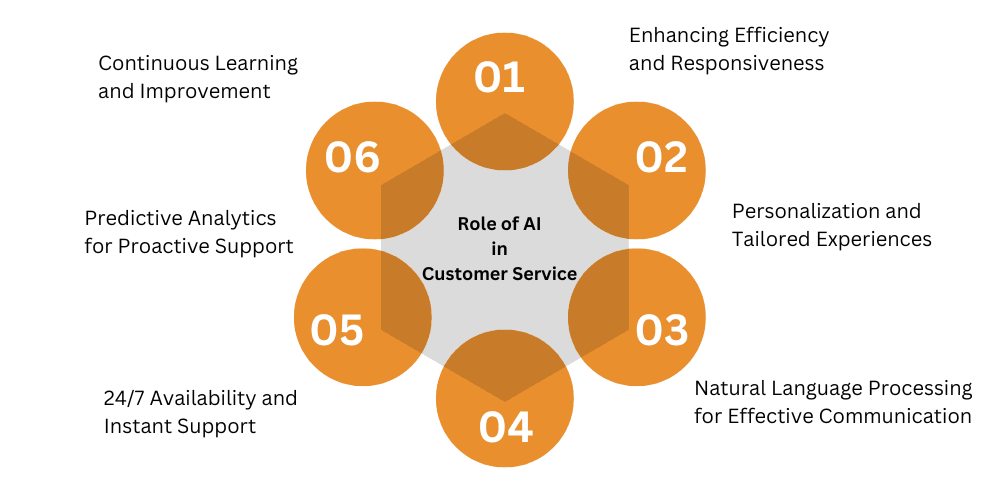In today’s fast-paced business landscape, delivering exceptional customer service is crucial for success. To meet the ever-increasing expectations of customers, businesses are turning to Artificial Intelligence (AI) to revolutionize their customer service operations. In this blog post, we will explore the significant role of AI in enhancing customer service and the invaluable benefits it brings to businesses.
AI empowers businesses to elevate customer support by deploying intelligent chatbots and virtual assistants. These AI-powered systems can handle customer inquiries, providing instant responses and practical solutions. With their natural language understanding and machine learning capabilities, AI chatbots offer round-the-clock support, reducing response times and significantly boosting customer satisfaction.
This blog post will show how AI enhances customer service, streamlines issue resolution processes, leverages predictive analytics for proactive support and continuously improves through feedback analysis. By harnessing the potential of AI in customer service, businesses can provide exceptional support and cultivate strong, long-lasting relationships with their customers. Join us as we explore the exciting possibilities of AI-powered customer service!
Importance of Customer Service in Business
Customer service is vital for business success as it directly impacts customer satisfaction and loyalty. Effective customer service builds trust, resolves issues promptly, and enhances the customer experience. Satisfied customers are likelier to repeat purchases, recommend the business to others, and contribute to positive word-of-mouth marketing. In a competitive market, superior customer service becomes a key differentiator, fostering brand reputation and long-term relationships. Ultimately, prioritizing customer service cultivates a loyal customer base, driving sustained growth and profitability for the business.
According to Capgemini, 63% of retail organizations are leveraging the power of generative artificial intelligence to enhance their customer service. Demonstrating a proactive approach, 40% of these businesses have established specialized teams and allocated budgets for integrating this transformative technology. This strategic adoption reflects the industry’s commitment to innovation. It underscores the growing recognition of AI’s role in elevating customer service standards, reinforcing the sector’s competitiveness, and ensuring sustained customer satisfaction.
Major Roles Of Artificial Intelligence (AI) in Customer Service

1) Enhancing Efficiency and Responsiveness
One of the primary roles of AI in customer service is enhancing efficiency and responsiveness. Traditional customer service methods often involve long wait times and delayed responses, leading to customer frustration. With AI-powered chatbots and virtual assistants, businesses can provide instant, round-the-clock customer support. These AI agents can handle multiple customer queries simultaneously, reducing wait times and ensuring prompt responses. By automating routine tasks, AI frees human agents to focus on more complex and critical customer issues, improving overall efficiency.
2) Personalization and Tailored Experiences
AI enables companies to deliver tailored and personalized experiences to their customers. By analyzing vast customer data, AI algorithms can understand individual preferences, behaviors, and needs. This allows businesses to offer customized recommendations, product suggestions, and targeted promotions based on each customer’s unique profile. Personalization enhances the customer experience and increases customer loyalty and satisfaction. AI-powered recommendation engines have become vital for businesses across various industries, from e-commerce to streaming services.
3) Natural Language Processing for Effective Communication
Effective communication is crucial for successful customer service interactions. AI-powered NLP technology enables machines to understand and interpret human language, both written and spoken. This allows customers to engage with businesses using natural speech without complex menus or pre-defined options. NLP-powered chatbots can understand customer queries accurately and provide relevant responses conversationally. By eliminating language barriers and enabling seamless communication, AI enhances the overall customer service experience.
4) 24/7 Availability and Instant Support
AI-powered chatbots and virtual assistants are available 24/7, providing instant customer support regardless of time zone or geographical location. This round-the-clock availability ensures customers can seek assistance at their convenience, increasing satisfaction and loyalty. Moreover, AI agents can simultaneously handle many inquiries without compromising quality or response time. This scalability allows businesses to provide consistent support during peak periods or unexpected surges in customer queries.
5) Predictive Analytics for Proactive Support
AI’s ability to analyze vast amounts of data also enables businesses to adopt a proactive approach to customer service. By leveraging predictive analytics, AI algorithms can identify patterns, trends, and potential issues before they arise. This empowers businesses to take preemptive measures and address customer concerns proactively. For example, AI algorithms can detect early signs of product defects or identify patterns of dissatisfaction among customers, allowing businesses to rectify issues promptly. Proactive support improves the customer experience and helps businesses mitigate potential problems before they escalate.
6) Continuous Learning and Improvement
Another crucial role of AI in customer service is continuous learning and improvement. AI algorithms can learn from past interactions, customer feedback, and historical data to improve their performance. With each interaction, AI systems become more intelligent, accurate, and capable of providing personalized solutions. This continuous learning process ensures that AI-powered customer service agents constantly evolve and adapt to changing customer needs and preferences.
Conclusion
The role of AI in improving customer service cannot be understated. AI development solutions have revolutionized how businesses interact with customers, providing personalized experiences, efficient issue resolution, and proactive support. By leveraging AI algorithms, businesses can gain valuable insights into customer needs, enhance engagement, and streamline feedback analysis. Furthermore, AI systems contribute to data security and privacy, ensuring customer information is handled securely. As businesses continue to embrace AI technology, the future of customer service looks promising, with enhanced experiences and increased customer satisfaction.